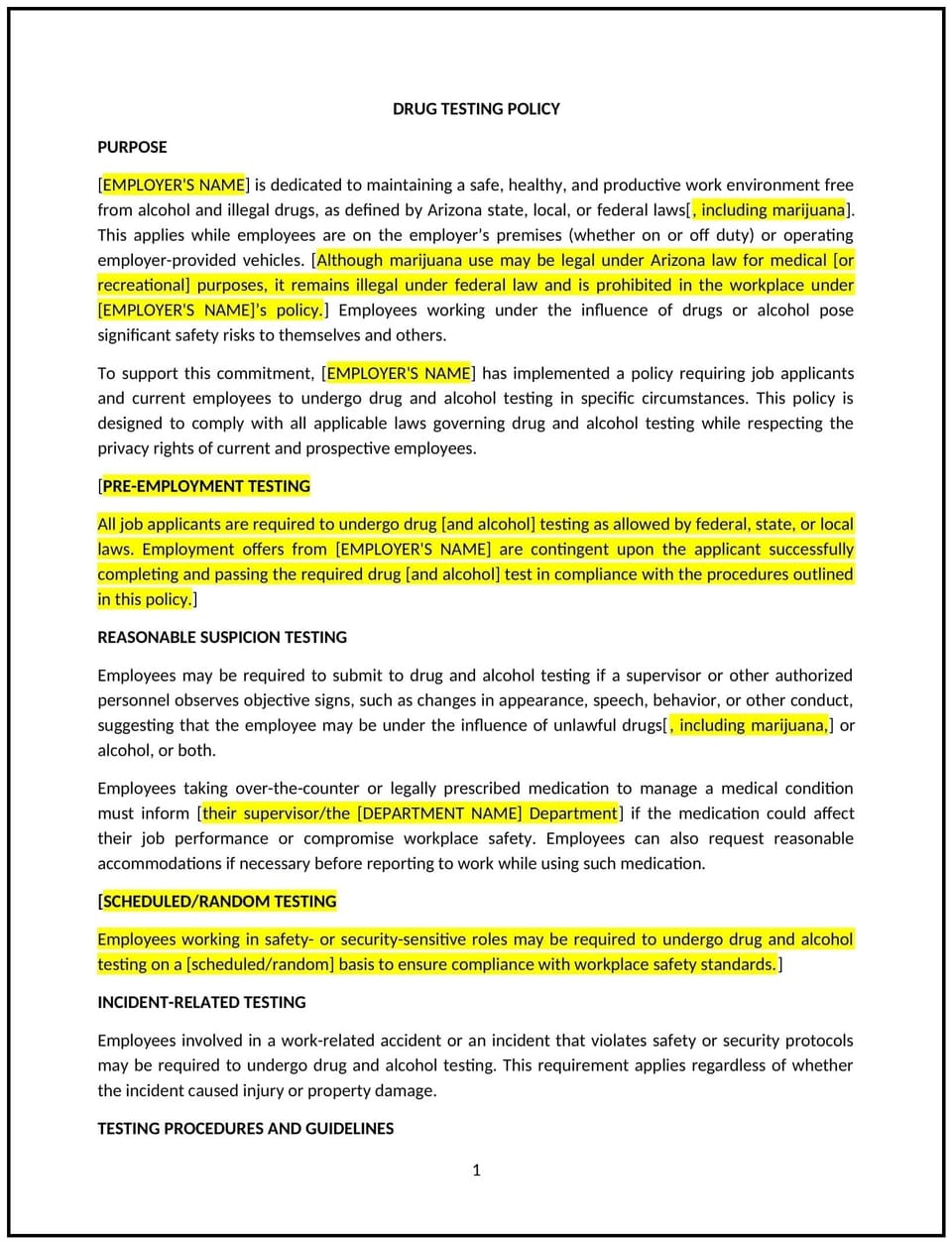Drug testing policy (Arizona): Free template: Free template

Drug testing policy (Arizona)
In Arizona, a drug testing policy helps businesses maintain a safe and productive workplace while supporting compliance with state and federal laws, including Arizona’s Drug Testing of Employees Act. This policy outlines the procedures for conducting drug tests, the types of tests performed, and how results will be handled to ensure fairness and consistency.
This policy specifies when testing may occur, such as pre-employment, post-incident, or randomly, and includes protections for employees using legally prescribed medications. By implementing this policy, Arizona businesses can reduce risks, support safety, and promote accountability.
How to use this drug testing policy (Arizona)
- Define testing circumstances: Clearly state when drug testing will occur, such as pre-employment, post-accident, reasonable suspicion, or randomly.
- Address legal compliance: Align the policy with Arizona’s laws, including accommodations for medical marijuana use as permitted under the Arizona Medical Marijuana Act (AMMA).
- Outline testing procedures: Detail the steps for administering drug tests, including notice requirements, testing methods, and handling of results.
- Protect confidentiality: Ensure all test results are handled securely and only shared with authorized personnel.
- Include consequences: Specify the actions that will follow a positive test result, such as disciplinary measures or referrals to assistance programs.
Benefits of using a drug testing policy (Arizona)
This policy offers several advantages for Arizona businesses:
- Supports workplace safety: Reduces risks associated with impaired performance, particularly in high-risk roles or industries.
- Promotes compliance: Aligns with Arizona’s Drug Testing of Employees Act and other relevant laws, minimizing legal exposure.
- Enhances productivity: Encourages a drug-free environment, improving focus and efficiency among employees.
- Protects employee rights: Balances the need for testing with respect for employee privacy and medical accommodations.
- Provides clarity: Establishes clear expectations and procedures, reducing misunderstandings or disputes.
Tips for using a drug testing policy (Arizona)
- Address Arizona-specific laws: Incorporate provisions for accommodating employees who use medical marijuana under the AMMA, unless it impacts workplace safety.
- Educate employees: Provide training and information about the policy, including their rights and the potential consequences of non-compliance.
- Use certified labs: Partner with certified testing facilities to ensure accuracy and compliance with Arizona regulations.
- Implement assistance programs: Include options for employee assistance or rehabilitation to support those who may struggle with substance use.
- Review regularly: Update the policy to reflect changes in state or federal laws, workplace practices, or industry standards.
Q: When can businesses conduct drug tests under this policy?
A: Drug testing can occur during pre-employment, after an accident, upon reasonable suspicion, or randomly, as outlined in the policy.
Q: How does this policy handle medical marijuana use?
A: Employees using medical marijuana under the AMMA are protected, but accommodations may not be made if it impairs safety-sensitive job performance.
Q: What happens if an employee tests positive?
A: The policy may include disciplinary actions, such as suspension or termination, but it can also offer referrals to assistance or rehabilitation programs.
Q: Are test results kept confidential?
A: Yes, all test results are stored securely and only accessible to authorized personnel to protect employee privacy.
Q: How does this policy support compliance with Arizona laws?
A: It aligns with Arizona’s Drug Testing of Employees Act and federal regulations, ensuring legal and ethical practices in the workplace.
This article contains general legal information and does not contain legal advice. Cobrief is not a law firm or a substitute for an attorney or law firm. The law is complex and changes often. For legal advice, please ask a lawyer.


